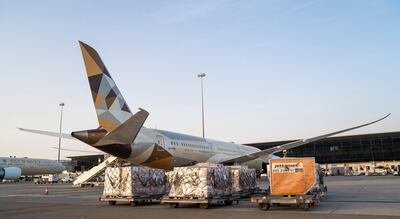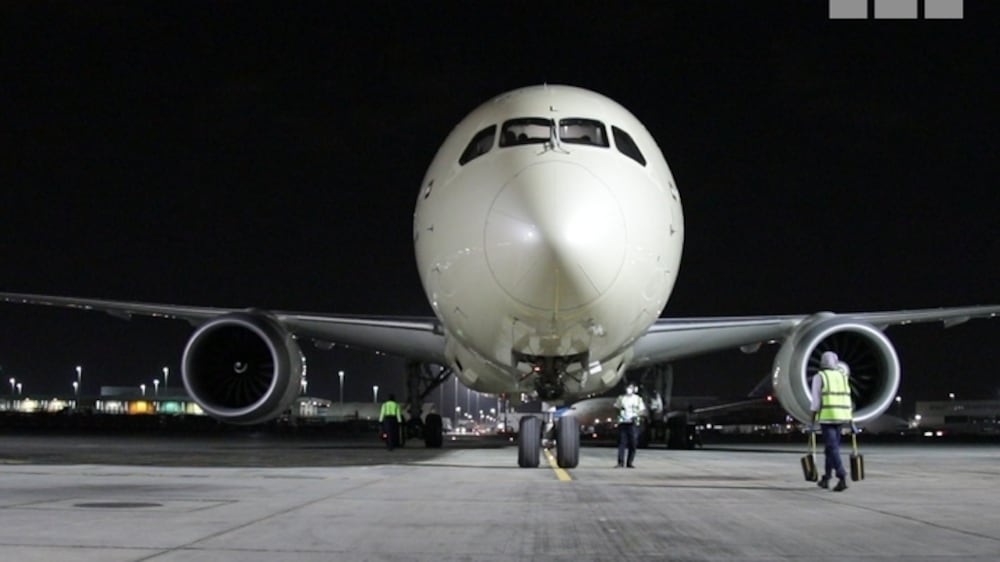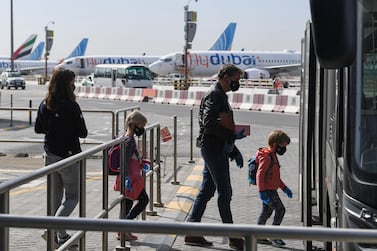For many of us, the Covid-19 pandemic means staying at home. It means days spent binge-watching Netflix, home schooling children and working on a rotation of clothes with an elastic waistband as the common denominator. But for the world's essential workers, that is not the case.
Several industries continue to operate during the health crisis and aviation is a crucial one of those. Most travellers may be grounded due to restrictions put in place around the world because of the coronavirus, but pilots are still operating the few flights that remain in the sky.
In the UAE, with passenger services suspended since March, cargo operations have been stepped up and repatriation flights are in operation to and from several countries. For Etihad Airways captains such as Leonardo Magno and Jay Power, flattening the curve is best done in the air.
“For most of us, sitting around at home is being part of the solution, but that can be frustrating. It’s much more satisfying to be able to get out there and actually be actively helping,” says Power.
The pilot – who has more than three decades of flying experience – says he is in the process of moving back into company-assigned accommodation for 10 weeks of flying service.
These apartments are being used by Etihad to ensure that pilots at the UAE’s national airline remain a low-risk category for contracting Covid-19.
840 hours away from home

For 21 days, pilots live in the furnished accommodation where meals and transportation to the airport are provided. They can watch television, cook, read, work out and rest, but they cannot leave the residences other than when they have a flight.
During a rotation, pilots will operate four or five cargo or repatriation flights. This is slightly less than what Etihad pilots would normally fly in a month, but a 14-day quarantine period at the end of each rotation means flight crew are having to deal with being away from home for an extended period of time.
Being away from home might come with the territory for aviation staff, but layovers typically last a day or two, with select destinations such as Los Angeles perhaps keeping pilots overseas for up to 72 hours. Now due to Covid-19, pilots could be away from home for 35 days in a row – a massive 840 hours in total.
For Power, whose family lives in Thailand, it makes sense to be flying, although he is struggling with the uncertainty of when he will see his loved ones again. “The hardest thing is just being away from them. That is not the job, it’s the virus. I can handle all of the rest of it, but not seeing my family and not knowing when I’ll see them again is hard,” he says.
Magno lives in Abu Dhabi with his wife and two young daughters and these extended periods away from home are tough. Having recently returned from five weeks of work, the Brazilian-born pilot is now looking at an impending 35 days away from his family.
“It’s difficult for all of us. I have young kids that I miss a lot and they are home schooling, so me being away really overloads my wife, but we understand this is the best course of action, it’s the safest way,” says the pilot. “I don’t want to come back home and expose my family to the virus."
'I’ve been tested about 10 or 15 times'

It is something that Etihad is taking no chances with. Every flight that lands in Abu Dhabi undergoes a series of checks and detection tests before crew and any passengers are allowed to exit.
“Every single time we land, whether it’s a cargo or repatriation flight, we have a team that come on to the aircraft and screen our temperatures. If we get the green light here, we can disembark and every person involved in that flight then has a nasal swab test. Only after that, can we go back to the company accommodation. It happens on every single flight, so I would say I’ve been tested 10 or 15 times,” says Magno.
Power says this testing is a new necessity that happens in several countries around the world – and it’s not always the most comfortable experience.
“In Beijing, it is a throat swab test and it’s a tiny bit uncomfortable. In Abu Dhabi, the nasal swab makes your eyes water, but in Shanghai it’s a nasal swab up each nostril and a throat swab, and I think they collected some brain tissue last time,” jokes the pilot.
How Abu Dhabi Airport is screening for the coronavirus

There was another underlying issue in China, says Power.
“They give you the test and four or five temperature checks and the whole time you can see these little quarantine boxes, just sitting in the corner of the airport. They are fibreglass with a little window and a chair inside them and it’s a bit worrying, because you know if you do not pass the tests they could put you in one of the boxes and wheel you away.”
Now that he is back in self-isolation in Abu Dhabi, the pilot already has the start of his next flight schedule which will take him to Jakarta, Mumbai and Melbourne – all on cargo operations. But flying in the pandemic is unpredictable, and scheduling can change at any minute.
“We used to know our schedule a month before time, but now it’s less than two weeks and it’s always changing. You just have to be ready and if you think you are going to one place tonight, you might well find out it’s actually somewhere else tomorrow,” says Power.
With the situation so changeable, there is always a worry the pilots could get stranded in another country. “It might happen, because once we land we have to follow the country’s procedures and it can change from last week, or any of your previous visits to the country,” says Magno.
Operational changes: sanitising, safety checks and brewing coffee

The operational side of flying has also temporarily changed. While social distancing in the cockpit is tricky – pilots sit less than a metre apart – sanitisation is key. Upon entering the flight deck, pilots must sanitise and wipe down every single button and switch that they might need throughout the duration of their next flight.
No passengers also mean no cabin crew, even on Etihad’s Dreamliners which are normally used for passenger services. This means the pilots are responsible for everything – including making their own meals, brewing coffee, arming doors and carrying out other safety checks throughout the cabins.
“Once you start flying cargo you learn the tricks and how to take care of yourself. You learn to make sure you have enough meals, enough water and enough coffee – that is important,” says Magno.
Perhaps thanks to the example of his father who worked as cabin crew on a Brazilian airline many years ago, the pilot takes such adjustments in his stride. “It’s a different way of things of doing things, but once you depart and you are flying, and doing what you do every day, you switch into cruise and everything seems normal.”
The jolt comes mid-flight, when pilots get up to stretch their legs or visit the bathroom. “You look back at an empty aircraft and even though you know you have lots of cargo in the belly, when you literally see that you could have 300 passengers sitting there and there is no one, the seriousness of the situation hits you,” says Magno.
Routes are also changing with Etihad flying to destinations outside of their normal network to pick up or deliver cargo. Restrictions around the world to stem the spread of Covid-19 via air travel mean that in many destinations, flight crew are not allowed to enter a country. This means a lot more turnaround flights to destinations that would have previously involved a layover.
Turnaround flights and hotel-room restrictions

“I recently flew to Johannesburg on a turnaround flight from Nairobi,” says Magno. South Africa’s borders have been closed to visitors for over a month and airline crew are not exempt from the restrictions. “We picked up a fully loaded cargo plane of food that would go back to Abu Dhabi. It was really packed with all types of meals: meat, vegetables, fruits and medical supplies too.”
When layovers do happen, it is not the same. Gone is the enviable lifestyle of those working in aviation and getting to see the world through their job. Etihad insists staff stay in their hotel rooms no matter how much they want to visit a famous landmark or go eat in a local restaurant.
“Every country has their own measures based on their threat level for the virus, but with Etihad, we have a policy, even if the country is more open, we need to stay in the room,” says Magno.
This means Etihad’s pilots are currently having more than their fair share of room service. To help, many of the hotels that the airline regularly uses have implemented new in-room dining services for crew. “Many hotels have widened the options and some are preparing special menus for us as they know we cannot leave our rooms,” says Magno.
On Power's recent flight to Beijing, he spent three days in one hotel room waiting for his next flight back to Abu Dhabi. He passed the time by binge-watching Netflix's Tiger King and studying philosophy via Coursera – an online learning app to which Etihad has given all its staff free access during the pandemic. Of course, a pilot's work is never done and there is plenty of studying to keep them busy now that flying regulations are changing faster than ever before.
No traffic, better efficiency and views to remember

Back in the air, it can be unnerving flying when the majority of the world’s aircraft are grounded.
“Sometimes, it can look like a terror movie because you can easily fly for an hour and not see another aircraft. In places like India, where normally it’s a very high level of traffic, you can fly for miles and not see another aircraft. That is the reality – we do not have many aeroplanes flying around,” Magno says.
“It’s scary because we know how it will affect the economy and also the airlines. But we have to face this and we have to overcome it,” says the captain.
Power had a similar experience on a recent flight to Bangalore. “When we left the UAE flying across the Indian Ocean usually I would compare it to driving down Sheikh Zayed Road on a Sunday morning, it’s very, very busy. This time, we had the entire sky to ourselves – it was eerie.”
Empty skies might be worrisome, but one thing that has improved with less traffic is on-time performance. “We are always before schedule, there is less traffic and you can take shortcuts. So it saves time, and it saves fuel,” says Magno.
Power agrees. “One of the things we usually have to deal is planning to fly at a particular altitude to make the most of winds and air density to reduce fuel burn, minimise time and fly efficiently. But there is only a limited number of altitudes we can use, so often it involves a bit of jockeying for position with everybody trying to get the altitude they want. Today, there is none of that. I want 37,000 feet, I get 37,000 feet.”
The increase in this efficiency is important. “I’m super aware that before Covid-19 the other massive challenge facing our planet is the environmental destruction we are wreaking up, so I’m very aware of fuel use and I’ve always tried to really minimise it. Now we easily can, we can fly super efficiently,” Power says.
One of the most memorable aspects of flying during the pandemic is what the pilots have been privy to through flight deck windows.
“The views we have had from up there have just been amazing. The reduction in pollution I guess is what it is from,” says Power. “We were flying back from Beijing, over the Himalayas, and everything was so clear, so bright. It’s really, really lovely up there right now.”







